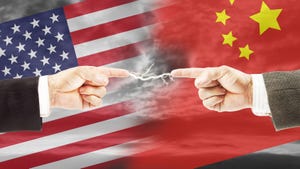The news you might have missed over Christmas
While the majority of us were working our ways through a mountain of turkey, some poor sods were still in work making sure everything still worked.
January 3, 2017

While the majority of us were working our ways through a mountain of turkey, some poor sods were still in work making sure everything still worked.
We’ve wrapped up some of the more important, less significant and arguably interesting stories from the last couple of weeks to ease you back into the world of laptops and stationary.
New year, new fibre consultation
Ofcom has been conducting what seems to be one of history’s most in-depth reviews to ensure digital communications markets continue to work for consumers and businesses, and now the UK Government has announced an open consultation to understand how a full-fibre roll out can be realized within the UK.
The ‘Call for Evidence’ aims to engage industry to understand how a full-fibre infrastructure can be established. Phase one will assess current approaches, phase two will look at alternative ones, and the final phase will decide which should be taken forward.
“Through this Call for Evidence we are seeking to understand how, through the use of public funding, the Government could take further action to encourage greater and faster deployment and extension of network infrastructure that will deliver full fibre connections to business and residential premises and, in time, support the rollout of 5G mobile services across the UK,” said Matt Hancock, the Minister of State for Digital and Culture, in a letter to the industry.
While the bureaucrats in Whitehall must be licking their lips at the prospect of a lengthy consultation and the dream of streams of red-tape, the rest of the industry will possibly be wondering why this consultation wasn’t done years ago. Yes, certain organizations have been favouring copper-alternatives to speed up the network, but surely a consultation like this crossed the minds of our politicians when the rest of the world starting rolling out fibre infrastructure.
UK falls in line with European data protection policy
Perhaps one of the more predictable moves by the UK government in recent years, however the UK will now officially fall-in behind the European Commission (hereafter known as the Gaggle of Red-tapers) in implementing the EU General Data Protection Regulation.
The Information Commissioners Office, the UK body which oversees data protection, has already hinted it would implement the regulation, though a statement from the Minister of State for Digital and Culture sets it in stone.
“The Review shows that there is a strong justification for regulation to secure personal data, as there is a clear public interest in protecting citizens from crime and other harm, where it may not otherwise be in organisations’ commercial interests to do so,” said Hancock in the statement.
“Government will therefore seek to improve cyber risk management in the wider economy through its implementation of the forthcoming General Data Protection Regulation (GDPR). The breach reporting requirements and fines that can be issued under GDPR will represent a significant call to action.”
The adoption of such a policy should not come as a massive surprise, as the UK government is seemingly looking for every opportunity to cosy up to the Gaggle of Red-tapers. While Brexit will put the UK out of the reach of Brussels, there is still a desire to remain in the single economy for obvious reasons.
Sacrificing decision making and independent thought in such areas as data protection may be a compromise the UK needs to make to ensure the nation isn’t completely removed from the single economy. The government will also be very keen to ensure data transmission between the UK and EU remains simpler than the long-standing Safe Harbour/Privacy Shield saga.
Microsoft and Volvo link up for connected vehicles
Volvo has announced a new partnership with Microsoft which will see Skype for Business integrated into its new 90 Series, turning the car into a mobile office.
With the Skype, Office and Azure offerings, Microsoft has turned itself into one of the most desirable technology vendors in the industry. Almost every business in the world will use at least one of the products, ensuring Microsoft has penetrated enterprise, making the brand a must have. The strong position in these core markets now offers the business a significant platform to drive into fringe markets, including the connected car.
“We’ve all been there. Sitting in the car trying to join a conference call,” said Anders Tylman-Mikiewicz, VP of Consumer Connectivity Services at Volvo Car Group. “You either fumble with or drop your phone while trying to connect or you forget the long pin code to join. It’s not the best way to start an important call in the car. On top of all that your attention is not where it should be – on the road. With the addition of Skype for Business all that goes away.”
The tie-up backs up another move Microsoft has made into the connected car segment, as it announced a partnership with Tom-Tom just before Christmas. The link-up supplemented Microsoft’s work in the location aware-IoT arena, which will be critical to the development of autonomous vehicles and the connected car.
Samsung plugs smouldering hole with mid-range revamp
To say 2016 was not a great year for Samsung would be an understatement. The well-publicised failings of the Galaxy Note 7 will cost the business in the region of $5.3 billion, though the team are seemingly taking a look at the mid-range market to compensate.
“At Samsung, we are always trying to ensure our customers have the most advanced products on the market,” said DJ Koh, President of the Mobile Communications Business at Samsung Electronics. “The latest Galaxy A series is a testament to this. We integrated our unique approach to design as well as the features Galaxy customers have come to love to provide added performance without compromising on style.”
It’s not necessarily the worst move to make for the brand. While smartphone manufacturers will always chase the premium market for the inflated profits, the mid-range market is still one which can haul in substantial revenues, especially considering a growing class of cash-conscious consumers and potential for sales in emerging markets.
The damage done by the Galaxy Note 7 to the Samsung brand over the Christmas period was notable. According to Flurry Analytics, Apple accounted for 44% of new device activations up to December 25, while Samsung stood at 21%. This is not necessarily a disaster as many would have expected Apple to lead this race, though Samsung had been catching the industry incumbent prior to its woes.
The Galaxy A series is similar to the premium Galaxy S range, though it is cheaper and the specs obviously lower. $5.3 billion is a big hole to fill, but chasing after a growing mid-range smartphone market is not the worst idea in the world.
Poland causes Facebook another data-sharing headache
UOKiK, the Polish Office of Competition and Consumer Protection, has announced an investigation into the Facebook policy of data sharing.
After an initial analysis of the standard agreements and rules of use on Facebook, UOKiK believes there is ground to investigate whether the social media giant is transparent enough with its users. It will investigate how users’ data is collected and shared with other parties, whether this has been effectively communicated, and also whether permission has actually been given by the users themselves.
“In the investigation we will be analysing the policy with regard to collection and sharing of user data and we will also examine whether the standard agreements might constitute an infringement of consumer rights in any other way,” said. UOKiK President Marek Niechciał said.
“Similar measures are being taken in other countries. Countries in Europe are paying more and more attention to large-scale internet platforms which give the appearance of being free of charge, while the cost that consumers pay for using them is their personal data.”
It has been a difficult couple of months for the internet giant. While there were few who would have been surprised to learn Facebook acquired WhatsApp to access the vast amount of personal information it has, the backlash over the new data sharing policy has been pretty substantial. All it wants to do is sell more advertising; can’t someone give Zuckerberg a break.
On a more positive note, Facebook achieved the number one and two positions in the US app race, according to Nielsen. While collecting the top two positions could be seen as a major victory for the brand, it is worth noting it is now very difficult to access Facebook messages without downloading the second Messenger app. It sounds like a big win, but in reality Facebook has strong-armed its users into downloading a second app.
Qualcomm feels the sharp-end of the Korean stick
The Korean Fair Trade Commission (KTFC) has slapped Qualcomm with a 1.03 trillion won fine, roughly $850 million, for violating antitrust laws, related to its licensing business.
The KTFC believes Qualcomm abused its dominant position in the market by restricting the licensing of mobile communications Standard Essential Patents, as well coercing manufacturers to sign unfair licensing agreements.
This is not the first time Qualcomm has gotten on the wrong side of the countries antitrust regulator. Back in 2008, the chip-maker was fined $208 million with the KTFC concluding that it had abused its dominant position. This case is still under appeal, and Qualcomm has also confirmed it will fight the most recent fine as well.
Here finds a way into China
Mapping technology firm Here has announced a strategic partnership with NavInfo and Tencent to develop location services for the Chinese market.
As part of the agreement, Here and NavInfo intend to form a 50/50 joint venture in China enabling location services for Chinese and global customers, whereas Tencent will incorporate the Here mapping and location platform services into its own products. Tencent and NavInfo will also jointly acquire a 10% stake in the Here business.
“Our intention has been to broaden our shareholder base to reflect how location intelligence will fuel invention and expansion across different industries in all parts of the world,” said Here CEO Edzard Overbeek.
“We are therefore excited to welcome NavInfo and Tencent both as strategic investors who share our vision of the future and as partners with whom we will create attractive new services for the Chinese market. We also welcome GIC as a financial investor who values the long-term prospects of the company.”
Google Maps is still the most dominant provider of mapping and location services in the segment, though this partnership is a significant win for Here. Ultimately it gives the business access into the highly lucrative Chinese market, something which Google has famously not managed to achieve to date. Google Maps might be the leader worldwide, though access to the worlds’ largest population and one of the fastest growing economies could be a notable move.
Heading the other direction, ownership in an international company such as Here gives Tencent another opportunity to grow in the global marketplace. Tencent already owns some dominant internet brands in the Chinese market, such as WeChat, and would appear to be building numerous entry points into the international arena.
About the Author(s)
You May Also Like











_1.jpg?width=300&auto=webp&quality=80&disable=upscale)


.png?width=800&auto=webp&quality=80&disable=upscale)